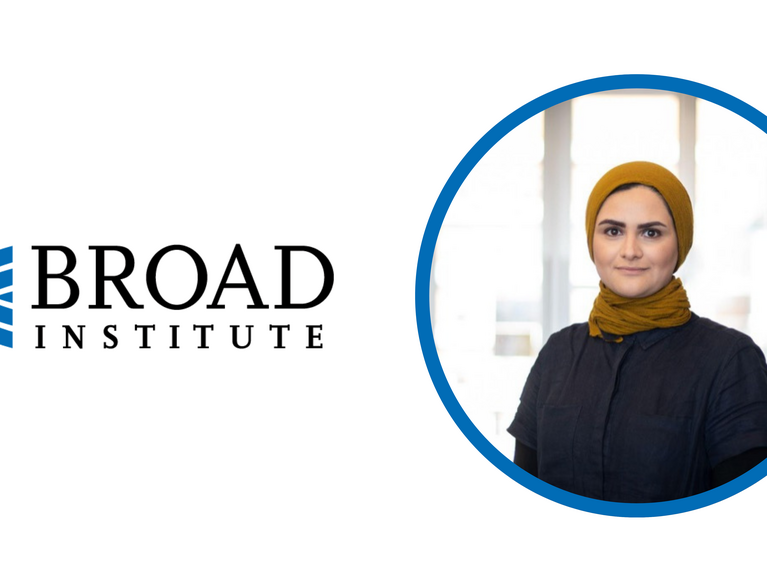Exploring New Frontiers in ML as a PhD: Soroor’s Journey to the Broad Institute

Soroor is a 4th year PhD student in Fabian Theis lab at Helmholtz Munich. She develops deep probabilistic models for data with low signal-to-noise ratio readouts such as Perturb-seq for genetic perturbation screens and Mass Spectrometry. Her research is on representation learning models for unpaired multimodal data. She uses deep generative models, statistics and causality in her research.
In 2023, Helmholtz Munich and the Eric and Wendy Schmidt Center at the Broad Institute of MIT and Harvard, launched a Collaborative Research Initiative.
In this interview, we chat with Soroor about her recent visit to the Broad Institute, where she did a research stay in Fei Chen’s group and the Eric and Wendy Schmidt Center, funded by a DAAD scholarship.
1. How did your visit impact your PhD project ?
I received extremely helpful feedback on my PhD projects, especially because they were very much aligned with the research at the Schmidt Center.
The suggestions helped me to better sharpen the goal of the projects and identify the proper biological applications that the community will actually need. The researchers there pointed me to the right ML/causality literature that I should use to strengthen the theoretical aspects of the models that I develop, for example.
2. What are the things you like the most about your stay at the Broad Institute?
Well, I worked in a biomedical research institute for over five years in Australia prior to the PhD in Germany, so I felt very much like home at the Broad! Nonetheless, joining the livestream of the press conference for the 2024 Nobel Prize in Medicine, meeting the scientists who have always inspired me, attending talks and lectures at MIT which is just across the road from the Broad, and having a conversation with the first recipient of the gene-editing therapy during Broad’s Annual Scientific Retreat made the full experience a blast overall. I also met people from different ethnicities and cultures, and the diversity there amazed me substantially.
On the personal development side, Broad offers a lot of training such as tips for a successful interview for faculty positions, financing your first house, etc. Attending the events organised by the different affinity groups, Vendor seminars, Career Lunch and Careers over Coffee events for women were also my favourites.
3. What would you take back from there?
Collaborations! Chen Lab actively develops multimodal spatial profiling technologies, with the recent one being the Slide-tags technology. We are developing a computational package for modeling their cancer Slide-tags data. Personally, I will continue my collaboration with some of the researchers at the Center on my PhD projects.
Aside from scientific collaborations, my fellows Ana Arruda, Laura Martens, Harika Urel and I at STEM-Tisch, a support network for women at Helmholtz, discussed implementing the Women@Broad model at Helmholtz. The Women@Helmholtz branding is already being used by the Diversity Office at the institute during Women’s Month after communicating the idea with them earlier in the year. We hope though that there would be follow-ups for the formation of a Women@Helmholtz affinity group to ensure women at the center are supported throughout the year.
4. How will the project you started there continue since you're back?
There are now several people from the lab involved in developing a computational package for the Slide-tags data. Slide-tags is one of the first technologies that enables tissue profiling at the single-cell resolution with full transcriptome coverage. We are excited to work with Slide-tags developers to help decipher the gene programs and changes in tissue organisation that lead to cancer progression and poor response to immunotherapy - by developing advanced machine learning models.
5. What would you recommend to other PhD students who want to visit the Broad Institute?
For early-mid stage PhDs, this is a great opportunity to identify where your research can be most impactful. For late stage PhDs, the visit helps you establish connections and find out about fellowship opportunities to plan your next move. A great place overall and lots of perks around! Make sure you don’t miss out Musica Lata! - a live music performance by Broadie scientists!
6. Any final words?
I would like to thank DAAD and Helmholtz for financial support; Theis Lab Office, HR, the Grants Office, and the scientific managers at the Helmholtz-Broad Cooperation in ML and Genomics initiative for their tremendous help and support with all the paperwork related to the scholarship and the visit. I read a quote that says “talent is everywhere, opportunity is not”. I’m grateful to all my colleagues and friends in Australia, US and Germany for their support which made this visit and the subsequent opportunities happen.